
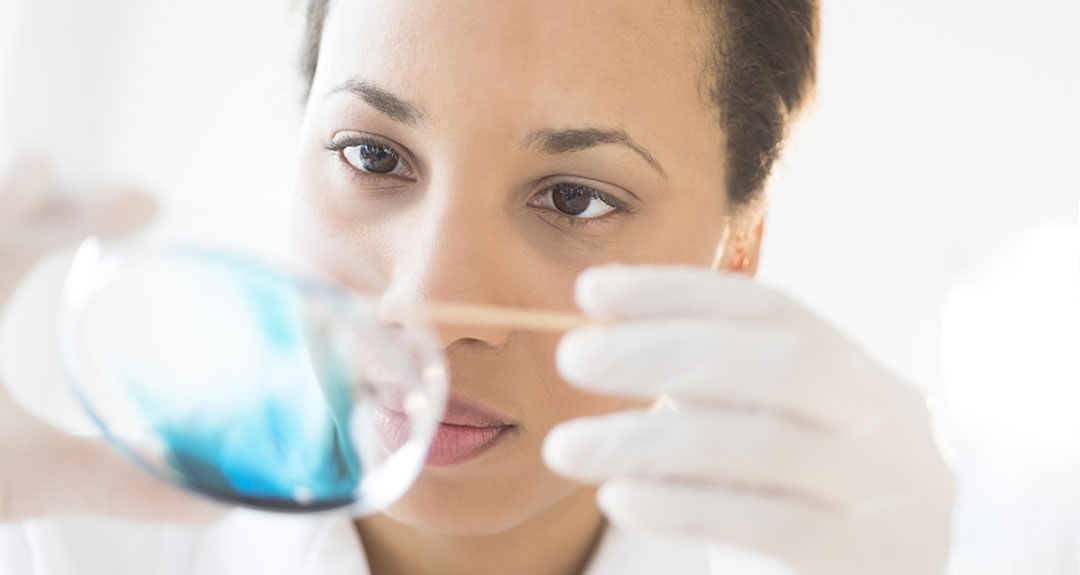
The Rainin Foundation provides early support for novel ideas that can lead to improvements in preventing, diagnosing and treating Inflammatory Bowel Disease.
From Discovery Science to Patient Impact
The Kenneth Rainin Foundation is known for taking smart bets on pioneering ideas in Inflammatory Bowel Disease (IBD) research. We’re endlessly inspired by the dedication and ingenuity of the field’s scientists and clinicians. We’re also firm believers in the power of collaboration and leveraging resources to achieve breakthroughs. In 2018, these qualities were front and center as we advanced our strategic focus on translational science. New partnerships and targeted investments set the stage for novel approaches to treat IBD and improve patient outcomes.
“The Rainin Foundation embraces groundbreaking and unconventional methodologies that prioritize patient impact.”
—Laura Wilson, PhD, Director of Health Strategy and Ventures
BREAKTHROUGH MOMENTS
Collaborating For A Cure
Dr. Aida Habtezion is collaborating with other Stanford University scientists to speed diagnoses and inform clinical treatments for Inflammatory Bowel Disease patients. Learn about her breakthrough moment in this video. Video credit: Lori Halloran
Expanding Leadership Across Disciplines
The Rainin Foundation’s Scientific Advisory Board helps guide our Health investments and programmatic decision-making. New Board appointments illustrate our commitment to translational science and the value of cross-disciplinary expertise. Dr. Tejal Desai was named Co-Chair, joining long-time Chair, Dr. Averil Ma. They bring together the distinct disciplines of bio-engineering and basic science.
Two new appointments boosted the Advisory Board’s translational science and clinical expertise. Dr. Scott Snapper is a researcher and clinician in gastroenterology. He directs the Inflammatory Bowel Disease Center at Boston Children’s Hospital and is Professor of Medicine at Harvard Medical School. Dr. Kevin Grimes is Co-Director of the SPARK Program in Translational Research at Stanford University School of Medicine. Both began their terms in January 2019.
“I’m looking forward to providing input that may help the Foundation’s outstanding group of researchers progress their discoveries into innovative new biomarkers and treatments for individuals living with Inflammatory Bowel Disease.”
—Kevin Grimes, PhD, Stanford University School of Medicine
![]()
228 abstracts, posters, peer-reviewed articles and patent filings were created by our Health grantees in 2018
47
Number of early-career researchers who received travel awards to present research at our 2018 Innovations Symposium
![]()
![]()
The Rainin Foundation’s Scientific Advisory Board welcomed two new members with translational science and clinical expertise.
Partnering to Advance Diet and IBD Research
The Rainin Foundation is one of only a few national funders dedicated to solving IBD. As a relatively small funder, we can achieve greater impact by combining forces with others around mutual priorities. In 2018, we partnered with the Helmsley Charitable Trust to advance diet research.
Dietary interventions are still an emerging field and there are gaps in the research. Dr. Garabet Yeretssian, Program Director for the Helmsley Charitable Trust’s Crohn’s Disease Program, shares our interest in diet and nutrition. To support the most effective grantmaking, we co-hosted an intensive workshop to gather perspectives directly from experts in the field. Thirty attendees from around the world included researchers, clinicians, translational scientists, patient advocates, and biotech and food industry representatives. Leadership from the Crohn’s and Colitis Foundation joined the workshop, which added a third national funder to the table.
Navigating collaborations among such diverse philanthropic partners raises challenges and opportunities. This diet workshop expanded our network of expertise and generated a lively and thoughtful exchange of ideas. Our shared will to innovate and succeed, along with our agility, infuses new possibilities into the work of dietary research in IBD going forward.
“The diet workshop will shape our roadmap for funding research into dietary interventions, translating to even greater benefits for people living with IBD.”
—Laura Wilson, PhD, Director of Health Strategy and Ventures
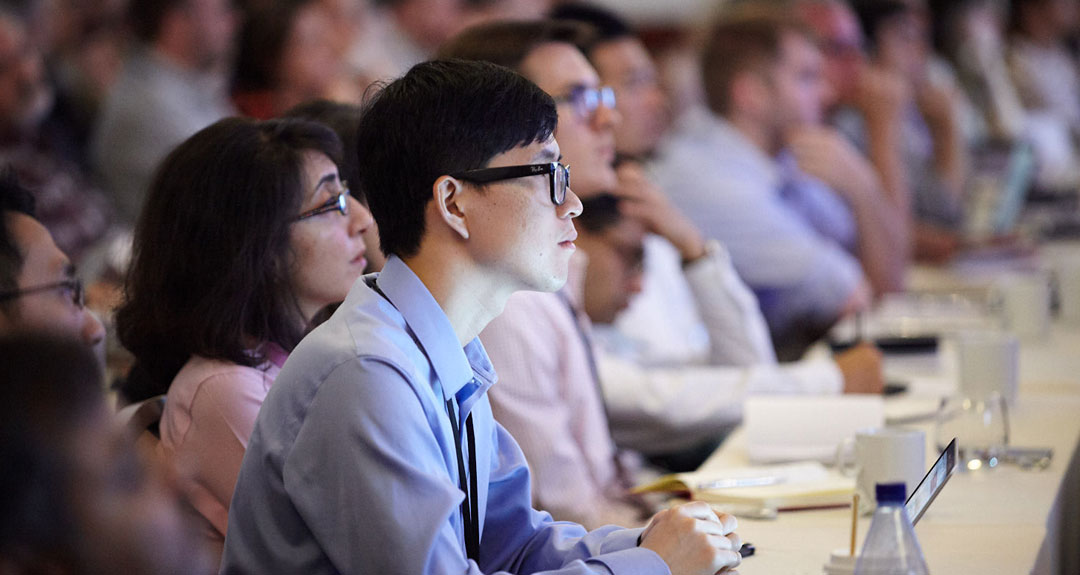
Listening to the latest research at the Innovations Symposium. Photo credit: Mitch Tobias
Bringing Creative Minds Together
Across the Foundation’s programs, we see how breakthroughs happen when creative minds come together. Research teams confronting the complexity of IBD benefit tremendously from a process of discovery that combines multiple disciplines and perspectives. Our Innovations Symposium magnifies this effect, fostering networks that connect investigators to new tools and knowledge, and to each other. Our seventh annual gathering in 2018 filled to capacity and drew scientists and industry from both the northern and southern hemispheres.
This Symposium highlighted the latest advances in basic and translational science, bridging the gap between science and patients. Distinguished speakers discussed work from within and outside of IBD research. Grantees presented exciting developments in their investigations. Academic and industry researchers explored how to get new treatments to patients. Poster sessions showcased a compelling array of research—in cell biology, microbiome, diet, immunity and inflammation, and new technologies.
Each year, Symposium attendees gain new insights and inspiration from top researchers in the field. We design the event to help researchers form new connections and trainees meet leaders in the field. We continue to be inspired by the partnerships formed because of this gathering—sometimes among researchers from the same institution.
Our annual Symposium is seeding the kind of cross-disciplinary thinking that can lead to new breakthroughs in IBD research. Our 2019 Innovations Symposium in Hawaii will be no different—with better access to sandy beaches and warmer waters!
“I was introduced to Dr. Aida Habtezion of Stanford University School of Medicine at the 2017 Innovations Symposium and now we’re embarking on a clinical trial together”
—Steve Axelrod, PhD, G-Tech Medical

Our investments support research that has the potential to yield transformative discoveries and insights into predicting and preventing IBD.
Funding Innovation
The Rainin Foundation’s Health funding invests in cutting-edge research that shows potential for accelerating new advances in IBD. Projects aimed at predicting, treating or preventing this disease span the spectrum from discovery science to direct patient impact.
In 2018, we doubled the grant amount for our Innovator Awards to support promising but untested ideas. Providing more resources—up to $200,000 per project—is especially important for early-stage research and less established investigators. Intriguing lines of inquiry by first-time grantees reflect the intricate dimensions of this complex disease.
- Christian Brendel and his team at the Dana-Farber Cancer Institute and Boston Children’s Hospital are investigating an alternative treatment for patients suffering from very early onset IBD, who have a poor long-term prognosis. These patients also have mutations in the receptor for IL-10. Encouraged by preliminary mouse modeling studies, the team proposes to restore IL-10 signaling through gene transfer into patients’ stem cells.
- Carla Rothlin at Yale University is addressing an unmet need in IBD therapy. Currently, untreatable conditions associated with the disease include fibrosis and strictures that arise because of aberrant wound healing. Her team is illuminating the biology of normal wound healing and studying why IBD is associated with abnormal healing.
- Marcia Goldberg at Massachusetts General Hospital focuses on a common form of the human gene ITLN1 associated with Crohn’s disease. Insights into the functional significance of this association may lead to developing treatments to control or prevent illness in individuals carrying this gene.
Continued grant funds went to fourteen Innovator Award teams that showed significant progress in advancing their original research hypotheses. Several of these projects focused on diet, investigating the role of dietary fiber, emulsifiers, simple sugars and cholesterol.
“Although the last decades have seen tremendous progress in how to control inflammation, the final frontier in IBD is how to heal the damaged tissue. The Rainin Foundation’s support encourages us to be intrepid and take on this challenge.”
—Carla Rothlin, PhD, Yale School of Medicine
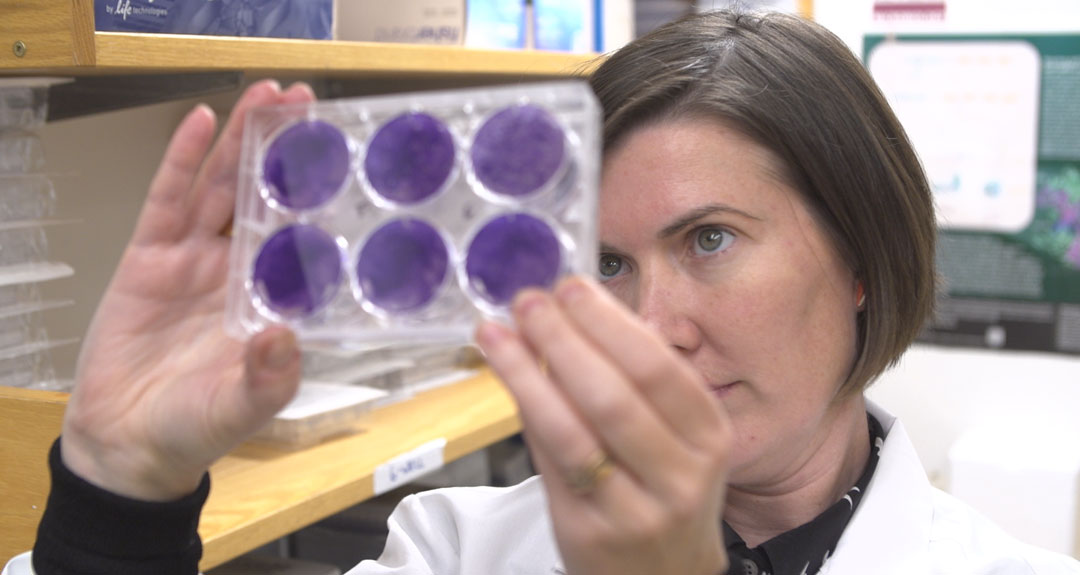
Dr. Kate Jeffrey, Massachusetts General Hospital, is collaborating with researchers at Technion – Israel Institute of Technology and McGill University. Photo credit: Lori Halloran
Embracing Collaborative Research
The Rainin Foundation’s Synergy Awards invest in cross-disciplinary teams that leverage the collective power of diverse talents and resources. Collaboration is essential to achieving the end product of each team’s research.
One group of Stanford University researchers—led by Drs. Stephan Rogalla, Sarah Streett and Garry Nolan—met for the first time at our 2017 Innovations Symposium. Their combined expertise bridges radiology, cell biology, immunity and inflammation, new technologies and bioengineering. Their team will develop a new biomarker assay to personalize patient therapies. Physicians can then choose the optimal drug and better understand each patient’s disease.
Technology and targeted therapeutic approaches also figure into the work of Dr. John Chang’s team at the University of California San Diego. They are investigating IBD as a disease complex with many distinct subtypes, each requiring a different treatment. Using a suite of advanced laboratory techniques, they will study the genetic instructions of thousands of individual cell samples to classify IBD into different diseases. Their ultimate goal is to identify novel regulators of IBD pathogenesis and potential new targets for therapy.
2018 was the first year we provided continued funding to previous Synergy Award grantees. Three groups showed significant progress in their research, including Dr. Aida Habtezion and her cross-disciplinary team for their work on immunity and inflammation in diseases affecting digestive organs. An outgrowth of their work is a cross-disciplinary registry to foster communication and data sharing among scientists, clinicians and patients.
“The Rainin Foundation has figured out how to make big bets on really important, somewhat risky things, yet get an incredible probability of success. They’ve injected incredible vigor into this field because they’re funding big ideas and the teams that know how to make these ideas happen.”
—Justin Sonnenberg, PhD, Stanford University School of Medicine
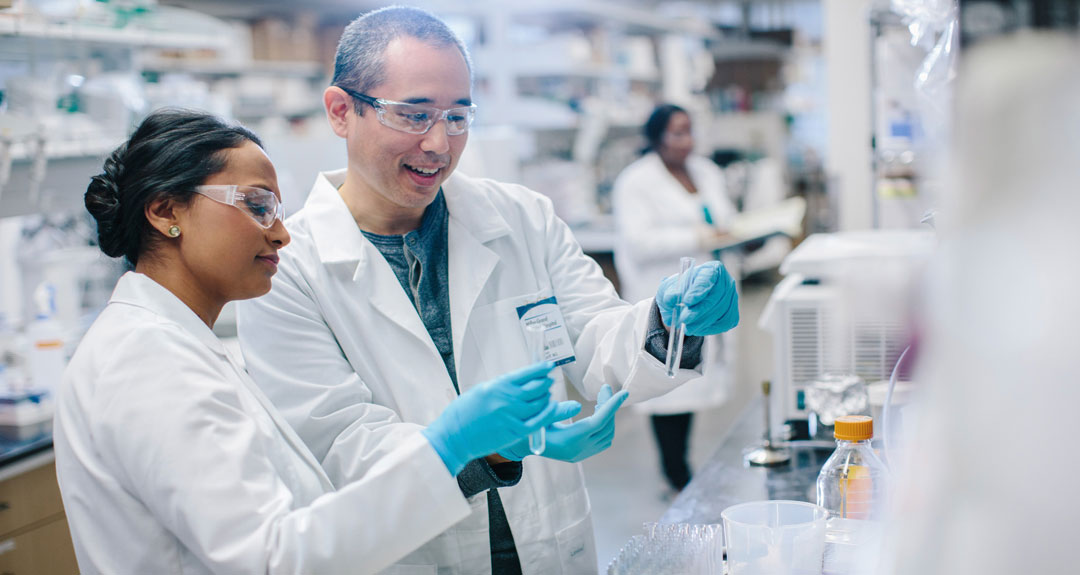
We support novel, high-risk research and challenge investigators to collaborate and push boundaries.
Investing in Breakthrough Research:
2018 Grantees
The Rainin Foundation invested over $6 million in 2018 to support IBD research.
Health grantmaking supports groundbreaking ideas that have the potential to dramatically transform the prediction and prevention of Inflammatory Bowel Disease.
Note: Financials are subject to audit verification
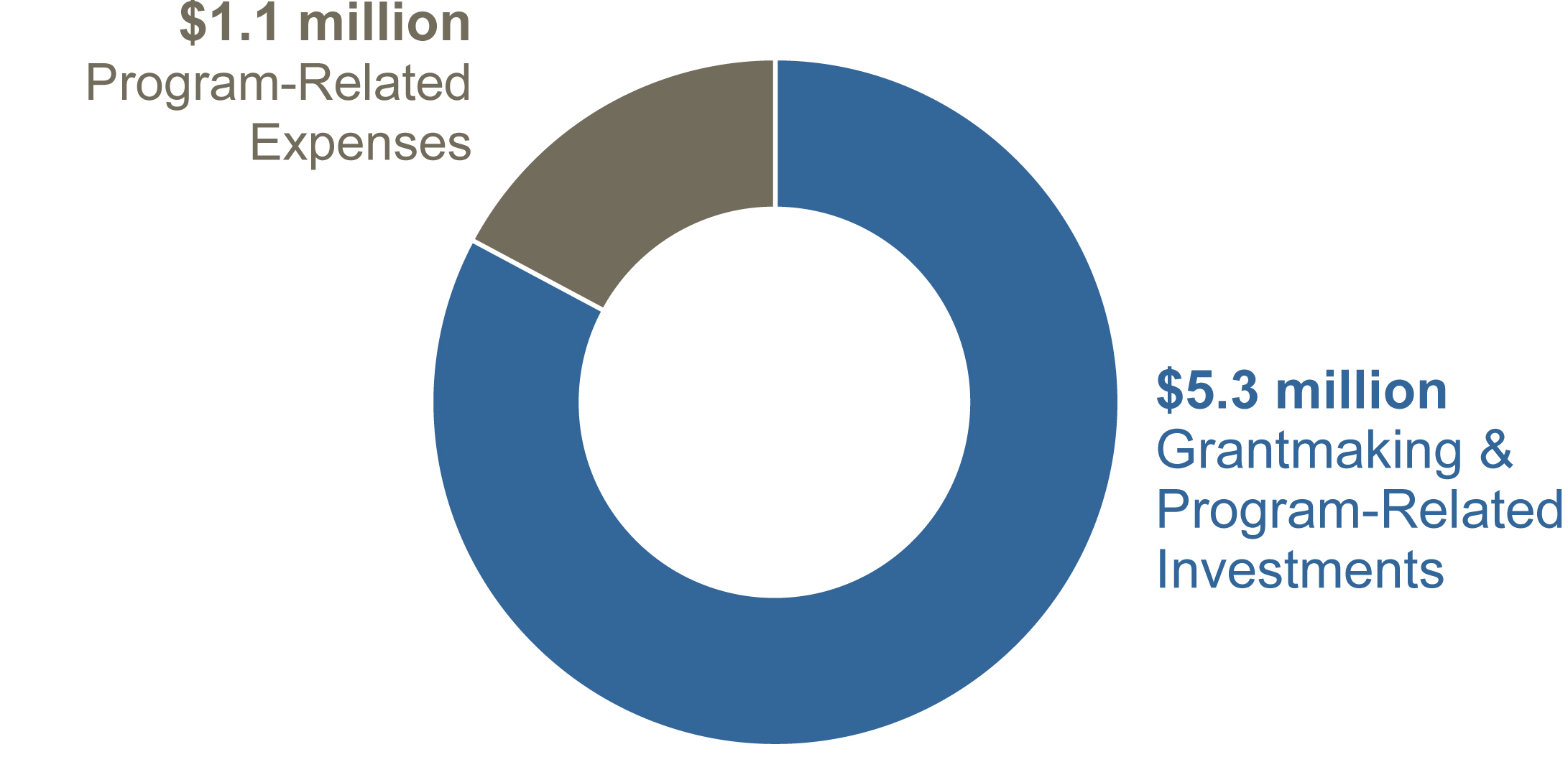
INNOVATOR AWARDS
Grants support an international pool of early-career and seasoned researchers to study untested ideas that could lead to breakthrough discoveries about IBD. View more information about these grants.
Christian Brendel, PhD, Dana-Farber Cancer Institute and Boston Children’s Hospital
Ajay Chawla, MD, University of California, San Francisco
Gerard Eberl, PhD, Institut Pasteur
Marcia Goldberg, MD, Massachusetts General Hospital
Rustem Ismagilov, PhD, California Institute of Technology
John Leong, PhD, Tufts University
Roni Nowarski, PhD, Brigham and Women’s Hospital
Carla Rothlin, PhD, Yale University
INNOVATOR AWARDS – CONTINUED SUPPORT
Researchers who demonstrate significant progress toward their goals are eligible for additional support of up to two years. View more information about these grants.
Megan Baldridge, MD, PhD, Washington University
Ken Cadwell, PhD, New York University
Benoit Chassaing, PhD, Georgia State University
Jean-Frédéric Colombel, MD, Icahn School of Medicine at Mount Sinai
Timothy Hand, PhD, University of Pittsburgh
Jun Huh, PhD, University of Massachusetts
Holly Ingraham, PhD, University of California, San Francisco
Eric Martens, PhD, University of Michigan
Corinne Maurice, PhD, and Irah King, PhD, McGill University
Edward Nieuwenhuis, MD, PhD, University Medical Center Utrecht
Noah Palm, PhD, Yale School of Medicine
Read Pukkila-Worley, MD, FIDSA, University of Massachusetts Medical School
Andrea Reboldi, PhD, University of Massachusetts Medical School
Neal Silverman, PhD, University of Massachusetts Medical Center
SYNERGY AWARDS
Grants support teams of researchers who are pursuing collaborative projects aimed at improving the prediction and prevention of Inflammatory Bowel Disease (IBD). View more information about these grants.
John Chang, MD, PhD, University of California, San Diego; Gene Yeo, PhD, University of California, San Diego; and William Sandborn, MD, University of California, San Diego.
David Padua, MD, PhD, University of California, Los Angeles and Karla Kirkegaard, PhD, Stanford University.
Stephan Rogalla, MD, Stanford University; Sarah Streett, MD, Stanford University; Garry Nolan, PhD, Stanford University; and Aaron Mayer, MS, Stanford University.
Russell Vance, PhD, University of California Berkeley, Karsten Gronert, PhD, University of California Berkeley, and Jakob von Moltke, PhD, University of Washington
SYNERGY AWARDS – CONTINUED SUPPORT
Research teams who demonstrate significant progress toward their original goals are eligible for up to two years of additional support. View more information about these grants.
Aida Habtezion, MD, Stanford University; Sidhartha R. Sinha, MD, Stanford University; and Justin Sonnenburg, PhD, Stanford University.
Gwendalyn Randolph, PhD, Washington University; Saurabh Mehandru, MD, Icahn School of Medicine, Mount Sinai; and Daniel Mucida, PhD, Rockefeller University.
Iliyan D. Iliev, PhD, Weill Medical College of Cornell University; Inga Peter, PhD, Icahn School of Medicine at Mount Sinai; and Jean-Frédéric Colombel, MD, PhD, Icahn School of Medicine at Mount Sinai.
Explore the Foundation’s website to learn more about our Health program.
